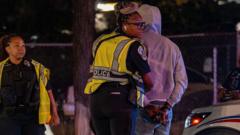Will Trump's Control Over DC Police End Soon?

Published: 2025-09-10 17:21:04 | Category: wales
President Donald Trump's direct control over Washington, D.C.'s police force is set to conclude on Wednesday, 30 days after he declared a "public safety emergency" in the capital. This unprecedented move allowed him to activate the National Guard and deploy federal officers in what he termed a crime crackdown. As the direct control period ends, the implications for the city's security and governance remain uncertain.
Last updated: 30 September 2023 (BST)
Key Takeaways
- Trump's 30-day direct control of the Metropolitan Police Department ends on 30 September 2023.
- Despite the conclusion, many federal officers and National Guard troops will remain in Washington, D.C.
- Crime statistics indicate significant reductions in crime during Trump's takeover.
- There are ongoing discussions in Congress regarding criminal justice reform in Washington, D.C.
- Trump hinted at potential future law enforcement initiatives in other cities.
Background of Trump's Control
On 11 August, President Trump declared a public safety emergency in Washington, D.C., allowing him to assume direct control of the city's Metropolitan Police Department (MPD). This declaration was rooted in concerns over crime rates, which he claimed had made the city unsafe for its residents. The Home Rule Act of 1973, enacted during Nixon's presidency, limits presidential control over D.C.'s local governance to a maximum of 30 days without Congressional approval. As this period draws to a close, questions arise about the next steps for local law enforcement.
Crime Rates and Federal Response
During Trump's administration of the MPD, law enforcement statistics showed a significant decrease in crime. According to the Justice Department, over 2,310 arrests were made, and 225 illegal firearms were confiscated. In comparison to the same period in 2024, overall crime reportedly fell by 15%, with violent crime dropping by an impressive 39%. Trump's assertion that the city is now "virtually crime free" has been met with both praise and scepticism.
Public Reaction and Criticism
While some residents and officials have lauded the reduction in crime, others have expressed deep concerns regarding the implications of Trump's control and the deployment of federal forces. The city's attorney general recently filed a lawsuit against the Trump administration, arguing that the National Guard's deployment was unconstitutional. Critics contend that the president's actions undermine local governance and set a troubling precedent for federal overreach in local affairs.
Congressional Dynamics and Future Legislation
As Trump's direct control comes to an end, Congress appears reluctant to extend this takeover. Republican House Speaker Mike Johnson indicated that there are no immediate plans for a vote on an extension, largely due to cooperation from D.C. Mayor Muriel Bowser, who has received praise from Trump for her efforts during the emergency. Nevertheless, members of the House Oversight Committee are moving forward with discussions on more than a dozen pieces of legislation aimed at reforming Washington's criminal justice system.
Proposed Changes to Criminal Justice
The proposed legislation includes measures to lower the age at which juveniles can be prosecuted and a controversial initiative to replace the elected attorney general of Washington, D.C., with a presidential appointee. These changes, if enacted, would require approval from both chambers of Congress and could drastically reshape the landscape of law enforcement and justice in the capital.
The Future of Law Enforcement in D.C. and Beyond
Looking ahead, Trump has hinted at announcing a new law and order initiative in another city, reportedly in collaboration with a state governor and local mayor. While he has not provided specific details, he mentioned the possibility of deploying federal assets to cities like Chicago or Los Angeles, which have been struggling with crime. This potential move raises questions about the effectiveness and appropriateness of federal intervention in local matters, particularly in Democrat-run cities.
Conclusion: Balancing Local Governance and Federal Power
The end of Trump's direct control over Washington, D.C.'s police force marks a significant moment for the city and its governance. As local officials navigate the aftermath of this unprecedented situation, the balance between ensuring public safety and maintaining local autonomy will remain a critical issue. The ongoing discussions in Congress regarding criminal justice reform could lead to substantial changes in how law enforcement operates in the capital and potentially set precedent for future federal involvement in local policing. As the nation watches, the implications of these developments will undoubtedly resonate beyond the District of Columbia.
FAQs
What led to President Trump's control of Washington, D.C.'s police force?
President Trump declared a public safety emergency due to rising crime rates in Washington, D.C., allowing him to take control of the Metropolitan Police Department for 30 days under the Home Rule Act.
How have crime rates changed during Trump's control?
During Trump's administration of the MPD, overall crime decreased by 15%, with violent crime falling by 39%, according to statistics from the Justice Department.
What happens when Trump's control ends?
Once Trump's control ends, local law enforcement will revert to its regular governance structure. However, many federal officers and National Guard troops are expected to remain in the city for the time being.
What reforms are being discussed in Congress?
Congress is considering several legislative changes, including lowering the age for juvenile prosecution and replacing the elected attorney general with a presidential appointee.
What future initiatives might Trump pursue regarding law enforcement?
Trump has indicated that he may announce a new law and order initiative in another city, potentially involving the deployment of federal assets to areas facing crime challenges.



